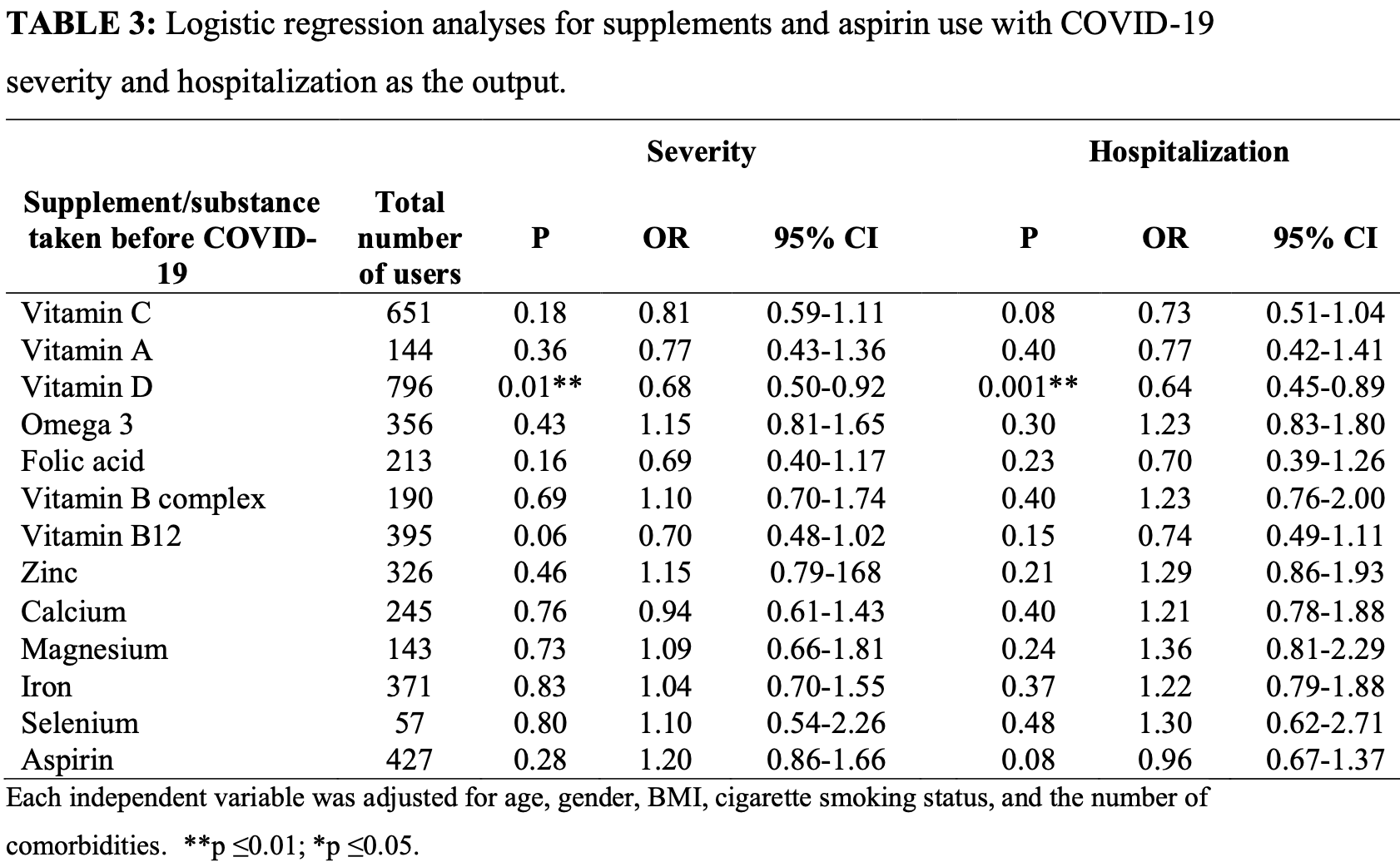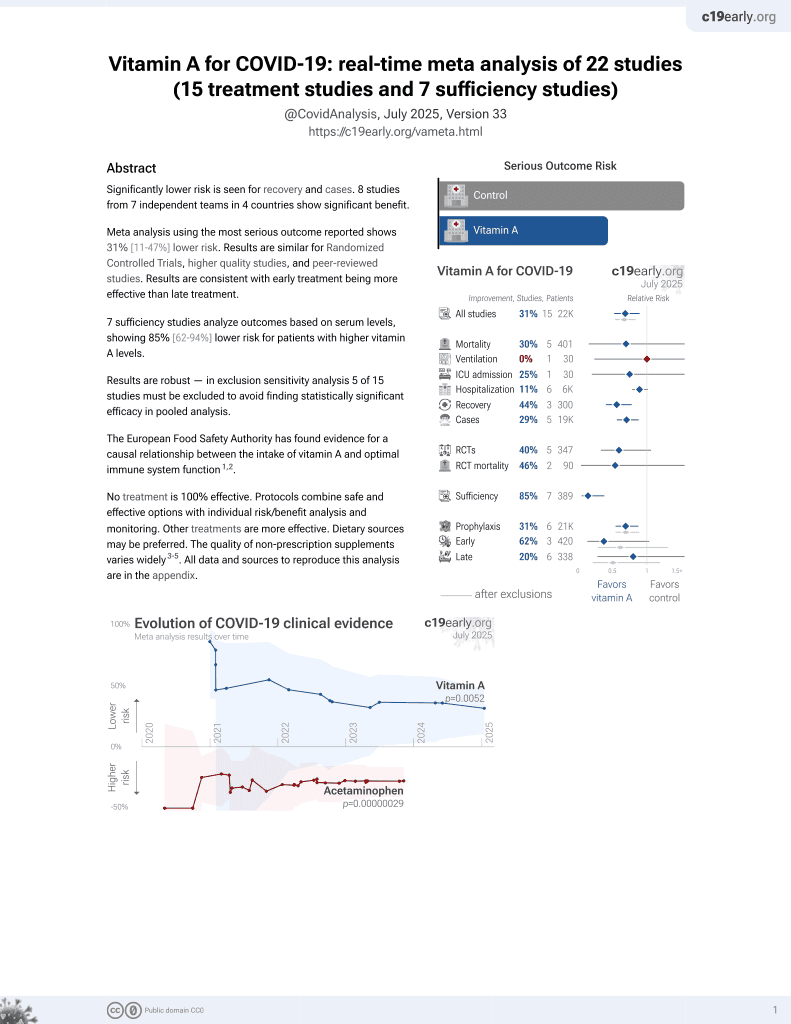
The impact of vitamin and mineral supplements usage prior to COVID-19 infection on disease severity and hospitalization
et al., Bosnian Journal of Basic Medical Sciences, doi:10.17305/bjbms.2021.7009, Feb 2022
Vitamin A for COVID-19
49th treatment shown to reduce risk in
May 2023, now with p = 0.004 from 14 studies.
No treatment is 100% effective. Protocols
combine treatments.
6,400+ studies for
210+ treatments. c19early.org
|
Retrospective 2,148 COVID-19 recovered patients in Jordan, showing no significant differences in the risk of severity and hospitalization with vitamin A prophylaxis.
Although the 21% lower hospitalization is not statistically significant, it is consistent with the significant 19% lower hospitalization [5‑30%] from meta-analysis of the 5 hospitalization results to date.
|
risk of hospitalization, 21.2% lower, RR 0.79, p = 0.40, treatment 15 of 144 (10.4%), control 204 of 2,004 (10.2%), adjusted per study, odds ratio converted to relative risk, multivariable.
|
|
risk of severe case, 20.8% lower, RR 0.79, p = 0.36, treatment 17 of 144 (11.8%), control 243 of 2,004 (12.1%), adjusted per study, odds ratio converted to relative risk, multivariable.
|
| Effect extraction follows pre-specified rules prioritizing more serious outcomes. Submit updates |
Nimer et al., 28 Feb 2022, retrospective, Jordan, peer-reviewed, survey, 4 authors, study period March 2021 - July 2021.
Contact: rmnimer@just.edu.jo.
The impact of vitamin and mineral supplements usage prior to COVID-19 infection on disease severity and hospitalization
Bosnian Journal of Basic Medical Sciences, doi:10.17305/bjbms.2021.7009
The BJBMS publishes an "Advanced online" manuscript format as a free service to authors in order to expedite the dissemination of scientific findings to the research community as soon as possible after acceptance following peer review and corresponding modification (where appropriate). An "Advanced online" manuscript is published online prior to copyediting, formatting for publication and author proofing, but is nonetheless fully citable through its Digital Object Identifier (doi®). Nevertheless, this "Advanced online" version is NOT the final version of the manuscript. When the final version of this paper is published within a definitive issue of the journal with copyediting, full pagination, etc. the new final version will be accessible through the same doi and this "Advanced online" version of the paper will disappear.
References
Abdulateef, Rahman, Salih, Osman, Mahmood et al., COVID-19 severity in relation to sociodemographics and vitamin D use, Open Med (Wars)
Alexander, Tinkov, Strand, Alehagen, Skalny et al., Early Nutritional Interventions with Zinc, Selenium and Vitamin D for Raising Anti-Viral Resistance Against Progressive COVID-19, Nutrients
Arthur, Mckenzie, Beckett, Selenium in the immune system, J Nutr
Bae, Kim, The Role of Vitamin C, Vitamin D, and Selenium in Immune System against COVID-19, Molecules
Bruyère, Cavalier, Souberbielle, Bischoff-Ferrari, Beaudart, None
Buckinx, Effects of vitamin D in the elderly population: current status and perspectives, Archives of Public Health
Darwesh, Bassiouni, Sosnowski, Seubert, Can N-3 polyunsaturated fatty acids be considered a potential adjuvant therapy for COVID-19-associated cardiovascular complications?, Pharmacology & Therapeutics
Demir, Demir, Aygun, Vitamin D deficiency is associated with COVID-19 positivity and severity of the disease, J Med Virol
Docherty, Harrison, Green, Hardwick, Pius et al., Features of 20 133 UK patients in hospital with covid-19 using the ISARIC WHO Clinical Characterisation Protocol: prospective observational cohort study
Ebrahimzadeh-Attari, Panahi, Hebert, Ostadrahimi, Saghafi-Asl et al., Keeping a Balance During the Pandemic: a Narrative Review on the Important Role of Micronutrients in Preventing Infection and Reducing Complications of COVID
Güven, Gültekin, Sulaiman, Aljuhani, Saleh et al., The effect of high-dose parenteral vitamin D3 on COVID-19-related inhospital mortality in critical COVID-19 patients during intensive care unit admission: an observational cohort study, European Journal of Clinical Nutrition
Hemilä, Chalker, Vitamin C for preventing and treating the common cold, Cochrane database of systematic reviews
Huang, Wei, Wu, Huang, Vitamin B 6 supplementation improves proinflammatory responses in patients with rheumatoid arthritis, European journal of clinical nutrition
Hussain, Mahawar, Xia, Yang, El-Hasani et al., Biomarkers of biological age as predictors of COVID-19 disease severity, Obesity research & clinical practice
Im, Je, Baek, Chung, Kwon et al., Nutritional status of patients with COVID-19, International Journal of Infectious Diseases
Katz, Yue, Xue, Seal, Bertenthal et al., Increased risk for COVID-19 in patients with vitamin D deficiency
Kaufman, Niles, Kroll, Bi, Holick et al., Association of vitamin D status and other clinical characteristics with COVID-19 test results, JAMA network open
Kumar, Kumar, Bedi, Gupta, Kumar et al., The correlation between serum selenium, zinc, and COVID-19 severity: an observational study
Li, Zhu, Zhang, Liu, Ji et al., Nutritional status is closely related to the severity of COVID-19: a multi-center retrospective study, Journal of infection in developing countries
Martineau, Jolliffe, Hooper, Greenberg, Aloia et al., None
Mcgregor, Chauss, Freiwald, Yan, Wang et al., An autocrine Vitamin D-driven Th1 shutdown program can be exploited for COVID-19, bioRxiv
Mehta, Mcauley, Brown, Sanchez, Tattersall et al., Confirmation of the high cumulative incidence of thrombotic complications in critically ill ICU patients with COVID-19: An updated analysis, Thromb Res
Moghaddam, Heller, Sun, Seelig, Cherkezov et al., Selenium Deficiency Is Associated with Mortality Risk from COVID-19, Diabetes Metab Syndr
Orces, Lorenzo, Guarneros, The Prevalence and Determinants of Vitamin D Inadequacy among U.S. Older Adults: National Health and Nutrition Examination Survey 2007-2014, Cureus
Oristrell, Oliva, Casado, Subirana, Domínguez et al., Vitamin D supplementation and COVID-19 risk: a population-based, cohort study, J Endocrinol Invest
Phelan, Katz, Lo, The novel coronavirus originating in Wuhan, China: challenges for global health governance, Jama
Polak, Stępień, Gol, Tabarkiewicz, Potential Immunomodulatory Effects from Consumption of Nutrients in Whole Foods and Supplements on the Frequency and Course of Infection: Preliminary Results, Nutrients
Rosa, Malaguarnera, Nicoletti, Malaguarnera, Vitamin D3: a helpful immuno-modulator, Immunology
Russell, Beard, Cousins, Dunn, Ferland et al., zinc. A Report of the Panel on Micronutrients, Subcommittees on Upper Reference Levels of Nutrients and of Interpretation and Uses of Dietary Reference Intakes, and the Standing Committee on the Scientific Evaluation of Dietary Reference Intakes Food and Nutrition Board Institute of Medicine, J Steroid Biochem Mol Biol
Shakoor, Feehan, Mikkelsen, Dhaheri, Ali et al., Be well: A potential role for vitamin B in COVID-19, Maturitas
Smet, Smet, Herroelen, Gryspeerdt, Martens, )D, Serum
Son, Noh, Lee, Seo, Park et al., Effect of aspirin on coronavirus disease 2019: A nationwide case-control study in South Korea, Medicine
Speakman, Michienzi, Badowski, Vitamins, supplements and COVID-19: a review of currently available evidence, Drugs Context
Springbett, Buglass, Young, Photoprotection and vitamin D status, Journal of Photochemistry and Photobiology B: Biology
Tan, Ho, Kalimuddin, Cherng, Teh et al., 's toll on the elderly and those with diabetes mellitus -Is vitamin B12 deficiency an accomplice
Toscano, De, Ii, Souza, Mirabal et al., None
Verity, Okell, Dorigatti, Winskill, Whittaker et al., Estimates of the severity of coronavirus disease 2019: a model-based analysis, The Lancet infectious diseases
Wessels, Rolles, Rink, Wijaya, Andhika et al., A. COVID-19: Current understanding of its Pathophysiology, Clinical presentation and Treatment, Clin Epidemiol Glob Health
Who, Who, WHO Coronavirus (COVID-19) Dashboard
Wiersinga, Rhodes, Cheng, Peacock, Prescott, Pathophysiology, transmission, diagnosis, and treatment of coronavirus disease 2019 (COVID-19): a review, Jama
Xia, Zhang, Liu, Duan, Zhang et al., Toward improved human health: efficacy of dietary selenium on immunity at the cellular level, Food & Function
Zhao, Zhang, Li, Jiang, Su et al., Benefits of Vitamins in the Treatment of Parkinson's Disease, Oxidative Medicine and Cellular Longevity
Zhu, Zhang, Li, Yang, Song, A novel coronavirus from patients with pneumonia in China, New England journal of medicine
DOI record:
{
"DOI": "10.17305/bjbms.2021.7009",
"ISSN": [
"1840-4812",
"1512-8601"
],
"URL": "http://dx.doi.org/10.17305/bjbms.2021.7009",
"abstract": "<jats:p>The COVID-19 pandemic has caused a global public health emergency. Nutritional status is suggested to be related to the severity of COVID-19 infection. Herein, we aimed to explore the impact of using vitamin and mineral supplements prior to COVID-19 infection on disease severity and hospitalization. In addition, the prior use of aspirin as an anticoagulant on the disease severity was investigated. A cross-sectional, self-administered survey was conducted between March and July 2021. Recovered COVID-19 individuals (age ≥ 18 years, n = 2148) were recruited in the study. A multivariate logistic regression was used to evaluate the associations of supplements and aspirin use with COVID-19 disease severity and hospitalization status. Among the participants, 12.1% reported symptoms consistent with severe COVID-19, and 10.2% were hospitalized due to COVID-19. After adjustment for confounding variables (age, gender, BMI, cigarette smoking status, and the number of comorbidities), the multivariate logistic regression model showed that the consumption of vitamin D supplements prior to COVID-19 infection was associated with a significant decrease in disease severity (OR = 0.68, 95% CI 0.50 - 0.92; P = 0.01), and a lower risk of hospitalization (OR = 0.64, 95% CI 0.45 - 0.89; P = 0.01). On the other hand, there were no significant differences in the frequencies of severe illness and hospitalizations with the consumption of vitamin A, folic acid, vitamin B12, vitamin B complex, vitamin C, zinc, iron, selenium, calcium, magnesium, omega 3, and aspirin before COVID-19 infection. Among the investigated nutrients, the use of vitamin D prior to COVID-19 infection was associated with reduced disease severity and hospitalization. However, more studies are required to confirm this finding.</jats:p>",
"author": [
{
"ORCID": "http://orcid.org/0000-0002-0545-3311",
"affiliation": [],
"authenticated-orcid": false,
"family": "Nimer",
"given": "Refat",
"sequence": "first"
},
{
"ORCID": "http://orcid.org/0000-0002-3006-3104",
"affiliation": [],
"authenticated-orcid": false,
"family": "Khabour",
"given": "Omar",
"sequence": "additional"
},
{
"ORCID": "http://orcid.org/0000-0002-2847-9397",
"affiliation": [],
"authenticated-orcid": false,
"family": "Swedan",
"given": "Samer",
"sequence": "additional"
},
{
"ORCID": "http://orcid.org/0000-0002-4905-7492",
"affiliation": [],
"authenticated-orcid": false,
"family": "Kofahi",
"given": "Hassan",
"sequence": "additional"
}
],
"container-title": [
"Bosnian Journal of Basic Medical Sciences"
],
"content-domain": {
"crossmark-restriction": false,
"domain": []
},
"created": {
"date-parts": [
[
2022,
3,
1
]
],
"date-time": "2022-03-01T17:42:22Z",
"timestamp": 1646156542000
},
"deposited": {
"date-parts": [
[
2022,
3,
1
]
],
"date-time": "2022-03-01T17:42:23Z",
"timestamp": 1646156543000
},
"funder": [
{
"DOI": "10.13039/501100019004",
"award": [
"20210173"
],
"doi-asserted-by": "publisher",
"name": "Deanship of Research, Jordan University of Science and Technology"
}
],
"indexed": {
"date-parts": [
[
2022,
3,
1
]
],
"date-time": "2022-03-01T18:14:50Z",
"timestamp": 1646158490043
},
"is-referenced-by-count": 0,
"issn-type": [
{
"type": "electronic",
"value": "1840-4812"
},
{
"type": "print",
"value": "1512-8601"
}
],
"issued": {
"date-parts": [
[
2022,
2,
28
]
]
},
"license": [
{
"URL": "https://creativecommons.org/licenses/by/4.0",
"content-version": "unspecified",
"delay-in-days": 0,
"start": {
"date-parts": [
[
2022,
2,
28
]
],
"date-time": "2022-02-28T00:00:00Z",
"timestamp": 1646006400000
}
}
],
"link": [
{
"URL": "https://www.bjbms.org/ojs/index.php/bjbms/article/download/7009/2462",
"content-type": "application/pdf",
"content-version": "vor",
"intended-application": "text-mining"
},
{
"URL": "https://www.bjbms.org/ojs/index.php/bjbms/article/download/7009/2462",
"content-type": "unspecified",
"content-version": "vor",
"intended-application": "similarity-checking"
}
],
"member": "6922",
"original-title": [],
"prefix": "10.17305",
"published": {
"date-parts": [
[
2022,
2,
28
]
]
},
"published-online": {
"date-parts": [
[
2022,
2,
28
]
]
},
"publisher": "Association of Basic Medical Sciences of FBIH",
"reference-count": 0,
"references-count": 0,
"relation": {},
"score": 1,
"short-container-title": [
"Bosn J of Basic Med Sci"
],
"short-title": [],
"source": "Crossref",
"subject": [
"General Medicine"
],
"subtitle": [],
"title": [
"The impact of vitamin and mineral supplements usage prior to COVID-19 infection on disease severity and hospitalization"
],
"type": "journal-article"
}
nimer
